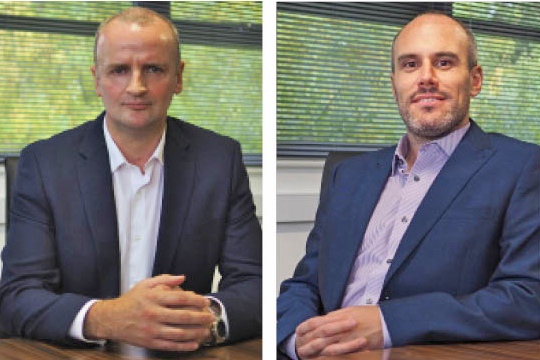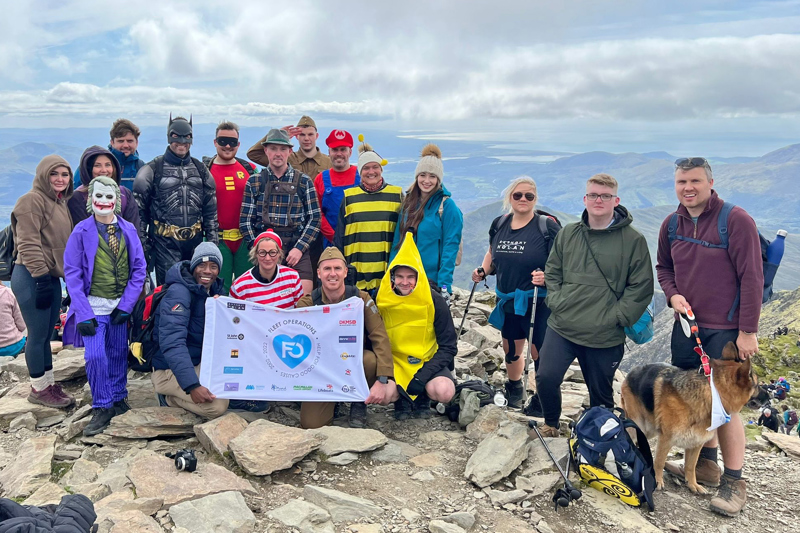
Celebrating its 20th year in business, Fleet Operations says the role of the fleet manager has changed dramatically in recent times.
The fleet management company was founded by chief executive officer Ross Jackson (left) as a consultancy firm focused on the needs of fleet decision-makers in 2002.
“Lots of different things aren’t right for everybody,” explains Jackson. “Our job in 2002, as it is today, is to guide people, challenge their assumptions and their thought processes, and to help them make decisions that are not only right for them for the short-, medium- and long-term, but are also right for their people.”
The dynamics have changed in recent years, however, with fleets unable to rely on vehicle discounts, once a mainstay of the fleet market.
“Today, the levers are different,” Jackson explains. “We had a very stable and mature industry going back to 2002, and today, especially post-Covid with all the supply chain shortages, the challenge is that the levers aren't the same any more.
“We now have to help people navigate a different course and become more flexible, but those guiding principles we had when we formed in 2002 remain the same today.”

Celebrating its 20th year in business, Fleet Operations says the role of the fleet manager has changed dramatically in recent times.
The fleet management company was founded by chief executive officer Ross Jackson (left) as a consultancy firm focused on the needs of fleet decision-makers in 2002.
“Lots of different things aren’t right for everybody,” explains Jackson. “Our job in 2002, as it is today, is to guide people, challenge their assumptions and their thought processes, and to help them make decisions that are not only right for them for the short-, medium- and long-term, but are also right for their people.”
The dynamics have changed in recent years, however, with fleets unable to rely on vehicle discounts, once a mainstay of the fleet market.
“Today, the levers are different,” Jackson explains. “We had a very stable and mature industry going back to 2002, and today, especially post-Covid with all the supply chain shortages, the challenge is that the levers aren't the same any more.
“We now have to help people navigate a different course and become more flexible, but those guiding principles we had when we formed in 2002 remain the same today.”
Jackson explains his company’s role is twofold. “For organisations that don’t have or don’t want fleet management, we will fulfil that role in every possible way we can,” he says.
“But for those that do, our job is to create change and help them make that change faster and quicker, to give them the insights that they need and to make them look good.
“That’s our job and if we can accelerate the growth and the importance of the fleet manager, that’s really important to me and our business, because we need somebody on that side of the table that talks the same language.”
FULL-SERVICE FLEET MANAGEMENT
After initially offering fleet consultancy in 2002, the firm widened its remit to offering fleet management services in 2006.
As companies looked to outsource their fleet management, Fleet Operations enjoyed rapid growth and expanded into international markets.
Its managing director Richard Hipkiss (above, right) says: “More recently, probably five or six years ago, as we’ve seen with a lot of categories in procurement, people have wanted to rationalise supply chains; they wanted to bring more things under one single provider.
“We made the strategic decision to start to bring maintenance, accident management and rental – all these other support services – in-house as opposed to managing third parties.
"That's where we went from being a management business to a full-service fleet management company.”
Hipkiss says that change has been “critically important” to the growth of the business pre- and post-Covid as fleets seek an outsourced solution.
“Because of the broad range of services that we built up over time, we can work with them to fit exactly what they need into our service portfolio,” he adds.
As a result, Hipkiss says he expects to see “significant” revenues this year from new as well as returning customers, predicting 15% year-on-year growth, with the company’s relatively small size, compared with other fleet management suppliers, a distinct advantage.
“Larger organisations are suffering from a service perspective at the moment, because they’re not agile enough; they can’t change or they can’t adapt processes,” he adds.
“The biggest shift we've probably seen in the past couple of years is organisations continuing to outsource, but also recognising the value of the fleet manager.”
CHANGING FLEET ROLE
Fleet decision-makers have become key enablers when it comes to the strategic direction of a business, particular in terms of decarbonisation.
The role, says Hipkiss, may not resemble that of a traditional fleet manager, with individuals now having a broader procurement responsibility, but they remain vitally important.
He explains: “A few years ago, when things were a little bit more stable, there were question marks over that role.”
Almost two-thirds (60%) of its customer base do not employ a fleet manager, but for the other 40% that do, Hipkiss says they are “very effective and very important”.
“We need to give those fleets and those fleet managers the tools, the systems and the automation to enable them to be effective without getting bogged down in terms of management administration.”
Hipkiss hopes that the company’s new platform, called Move, will provide the solution. He says:
“It’s very much going to deliver a level of automation that doesn’t exist in the market and will enable those fleet decision-makers to be far more strategic than they can be today.”
DEVELOPING TECHNOLOGY
The fleet management platform, which is desktop-, tablet- and mobile-enabled, provides a portal for drivers with access to all key services, including a live chat function, vehicle ordering, personal tax and trade up/down calculations.
For fleet decision-makers, it offers a sequential online ordering process, a car configurator and access to a range of suppliers and funding methods.
A commercial vehicle configurator includes ancillary equipment, racking and livery requirements, while Move’s fleet dashboard shows key fleet metrics and data.
Configurable reporting, meanwhile, will provide both high-level business intelligence summaries right down to granular cost and performance.
Fleet Operations is continually developing the platform and says fleets can look forward to some “big features” being released later this year.
“The next stage is to really develop the core elements of the fleet management system, providing greater automation through artificial intelligence,” says Hipkiss.
Fleet Operations employees raise £20k+ for good causes to mark 20th year

Fleet Operations marked its 20th year by raising more than £20,000 for 20 local and national causes, including Macmillan Cancer Support, British Heart Foundation and Dementia UK.
Local causes included the Douglas Macmillan Hospice in Stoke-on-Trent and the Peter Pan Centre in Newcastle-under-Lyme for children with special needs.
The activities, undertaken last year, included a fancy dress ascent of Snowdon (pictured), a charity football match and a walk around the world, where employees collectively completed 49.8 million steps.
Fleet Operations’ employees also took part in a 24-hour, 874-mile cycle as part of the company’s 20th anniversary fundraising challenge.
Using three static bikes donated by Keele University, 40 members of staff pedalled a distance equivalent to cycling from Land’s End to John O’Groats.
Richard Hipkiss paid tribute to the fund-raising efforts of its staff.
“It’s been an amazing effort from everybody involved,” he says. “It has really brought the teams together and we’ve had a lot of fun along the way.”
Reflecting on the company’s 20th year, he adds:
“The success of the business is down to our people, it’s down to our customers and it’s down to our business partners.”
Ross Jackson adds: “Today, we have 85 employees, a strong UK and international business, and we’re managing 215,000 vehicles in 39 markets, so I’m quite pleased with how it’s gone. It’s been a fantastic journey and we very much look forward to the next 20 years.”
Login to continue reading.
This article is premium content. To view, please register for free or sign in to read it.



















Login to comment
Comments
No comments have been made yet.